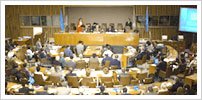|
The United Nations Committee of Experts on Public Administration (CEPA)
About CEPA
The United Nations Committee of Experts on Public Administration, established by the Economic and Social Council (ECOSOC) in its resolution 2001/45, is comprised of 24 members who meet annually at UN Headquarters in New York. The Committee is responsible for supporting the work of ECOSOC concerning the promotion and development of public administration and governance among Member States, in connection with the UN Millennium Development Goals. [Read More]
CEPA in the Past
The ECOSOC, in its resolution 1199 (XLII) of 24 May 1967, requested the Secretary-General to elaborate specific objectives and programmes in the field of public administration, in close collaboration with the specialized agencies and relevant non-governmental organizations. It also decided that the United Nations Programme in Public Administration and Finance should be reviewed by a meeting of experts who should submit their report to the Council for consideration. [Read More]
Please click here to view CEPA Resolutions by Session and CEPA focus areas in relation to DPADM Work.
CEPA Members, please click here to access the CEPA e-Workspace.
CEPA Sessions:
Note: Before the Committee of Experts on Public Administration was renamed it was called the Group of Experts in Public Administration and Finance. Click here to see sessions 12 to 15 of the Group of Experts in Public Administration and Finance
 In addition, the Committee also provides programmatic guidance to the Division of Public Administration and Development Management (DPADM), including the annual review of its work programme.
Since its conversion from a Group into a full-fledged Committee in 2001, CEPA has been meeting annually to provide guidelines on public administration issues related to the implementation of the internationally agreed development goals (IADGs), including the Millennium Development Goals (MDGs). It has also reported to ECOSOC on the governance and public administration dimensions of sustainable socioeconomic development, particularly focusing on the themes of human capital development, participatory governance, capacity development in crisis and post-conflict countries, and innovations in public administration and governance, among others.
The Economic and Social Council (ECOSOC), in its resolution 1199 (XLII) of 24 May 1967, requested the Secretary-General to elaborate specific objectives and programmes in the field of public administration, in close collaboration with the specialized agencies and relevant non-governmental organizations. It also decided that the United Nations Programme in Public Administration and Finance should be reviewed by a meeting of experts who should submit their report to the Council for consideration.
In subsequent resolutions, the Council invited the Secretary-General to convene meetings of the Group of Experts on the United Nations Programme in Public Administration and Finance and assigned the Group guidelines, including:
- an examination of trends in public administration and finance at local, national, regional and transnational levels
- a review of issues and priorities in public administration and finance for development, particularly with focus on developing countries, least developed countries and countries in and post-crisis
- an account of the progress achieved in implementing the relevant provisions of the United Nations Development Agenda (from a public administration perspective)
Following the resumed fiftieth session of the General Assembly on public administration and development, and guided by the resulting resolution 50/225 of 19 April 1996, the thirteenth and fourteenth meetings of the Group of Experts were convened in 1997 and 1998 to assist in the implementation of the decisions taken by the Assembly. At its fourteenth meeting, the Group recommended that the Secretary-General conduct a five-year assessment of the progress made in the implementation of resolution 50/225 and to report his findings to the Assembly through the Council in 2001. The Assembly endorsed that recommendation in its resolution 53/201 of 22 February 1999.
At its fifteenth meeting, held from 8 to 12 May 2000, the Group of Experts made a number of recommendations on its status and reporting arrangements, which were endorsed by the Council in its decision 2000/231 of 27 July 2000.
In paragraph 1 of the annex to its resolution 2001/45 of 20 December 2001, the Council decided that the Group of Experts on the United Nations Programme in Public Administration and Finance should be renamed the Committee of Experts on Public Administration. Unlike the Group of Experts, which provided advice to the Secretary-General and had a weak relationship to ECOSOC, the Committee was expected to provide formal advice to ECOSOC, even though its mandate did not change.
|

|